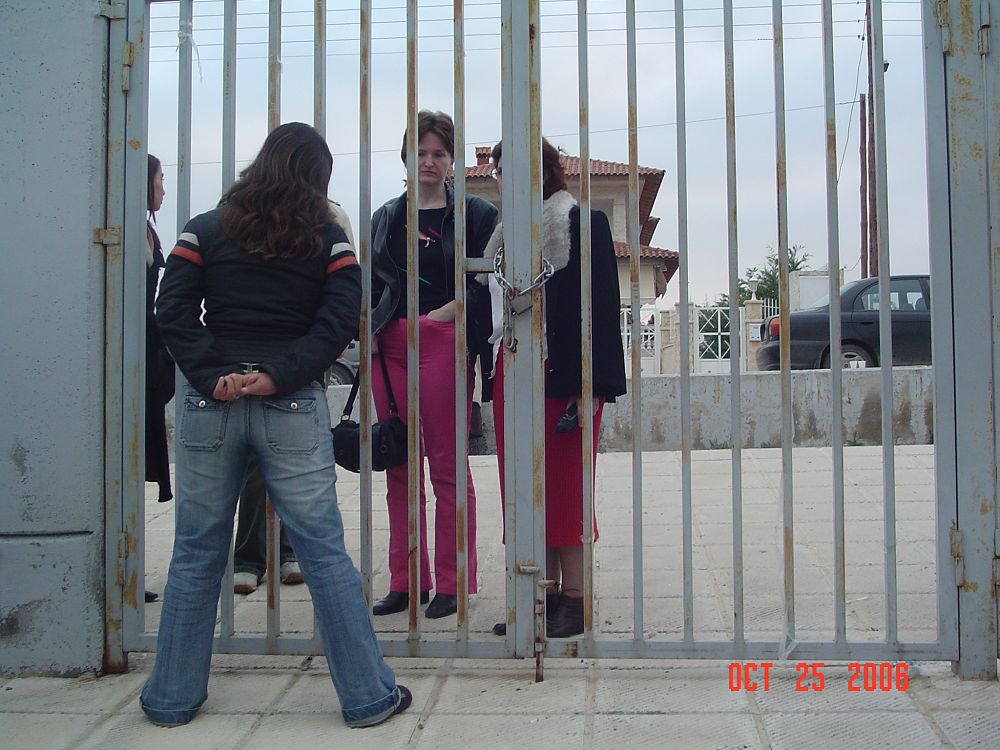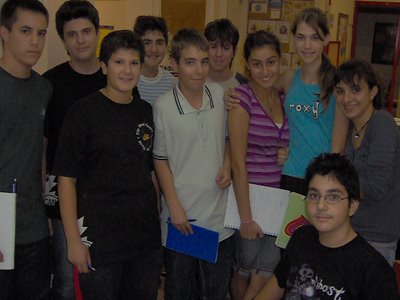You can see the various speeches and work shops here.
Tuesday, October 31, 2006
Freedom of speech on the net
It seems that the Blogme case has lit up the Greek blogosphere like a Christmas tree on steroids. The news the Antonis Tsiropoulos, the site administrator was arrested and charged with God knows what law for linking to a site that satirising the ultra - nationalist nutcase, Dimothenes Liakopulos has deeply angered the blogging community here. Coming at the same time as the Internet Governance Forum in Greeece, it graphically shows that despite words to the contrary, The Greek authorities are ready to use authoritarian tactics to deal with what they either cannot understand or find suspicious.
While looking at other blogs talking about the Blogme case I've come across a whole series of cases of the police raiding internet user's home and confiscating their equipment on the flimsiest of excuses. Take for example the case of Dimitis Fotiou, an Athenian sculptor, who set up a mock site which supposedly allowed people to find "help" i.e. get in contact with those in power who could pull strings ("rousfeti", in Greek) so that they could get a place in the civil service.
His sense of irony was apparently lost on the police who arrested him, confiscated his equipment and held him in custody for three days. Read here and here what another bloggers say about the case. Unfortunately, as the court case is pending, Dimtrios cannot speak on his own behalf. Given such attitudes it's hardly surprising that Reporter without Borders ranked Greece 32 (out of 168) in terms of freedom of the press.
Or there is the case of Rick Downes, a Swedish programmer arrested in Hania, Crete charged with illegally selling pharmaceuticals on the net and spamming (see here).
"Downes strongly denies the accusations and maintains there is nothing to link him with the spam messages. He said his knowledge of computers was taken as suspicious by investigators who knew nothing about technology.
We tried to explain to the police that what most likely happened is that the travel agent's computer is compromised and that her address book (including the addresses of her two friends who've met Rick) has been harvested for use by spammers, but they did not understand this. They were very unsophisticated in terms of computers and seemed to believe spammers met people and collected email addresses one by one," Phillips said."
Time and time the police's answer is to arrest and intimidate, irrespective of whether or not they have the slightest clue what it is the "offending" internet user has done.Monday, October 30, 2006
Back to education
Lesson plan
1 This is optional. If you can find the film Soylent Green on DVD/VHS.
2 Tell students that they're going to see part of a film that talks about the future and that they should say what they think is the meaning of the sequence. Play the first three minutes. (Basically, it's a photo-montage that shows how the pace of industrial life has quickened and the effects that is having on the planet).
3 Students discuss their answers in pairs and then report back to the teacher.
4 Give out the photocopy (see below).

5 Do the warm up questions from the photocopy. Students write down their answers then form groups to discuss them.
6 Elicit answers from the groups.
7 Go through the handout, deal with any problems with vocabulary.
8 Divide the class into five groups, one for each lobby and another group who will be judges.
9 Explain to students that each lobby has to talk for two minutes, .presenting their opinions.on why the mill should or should not be built. The judges think of questions to ask each group.
10 Then conduct a class debate; You could use the following format, if you wish.
A - Each lobby presents their opinion (no other group is allowed to speak). While the group is speaking, the other notes down questions, objections etc.
B – The other groups ask their questions.
C – The judges ask questions or asks for clarifications.
The cycle is repeated again for each of the other groups.
11 When every group has had their chance to speak then the judges make their decision and explain to the class what they've chosen an why.
1 Ask students to create their own eco-video using their own pictures and/or ones from the internet (they also get to choose their own music). This could be turned into a short video using Window's Movie Maker,which is on every XP equipped PC. Or you could download Microsoft's free Photo Story 3 which is a great way to get newbies creating stuff for say, YouTube.
2 Ask your students to create their own TV/radio spot which sets out their own opinion on the matter. This could be posted on the class blog, again via YouTube or as a podcast using Odeo.
3 Students write their own newspaper article, using the debate as a basis. They should also interview the various parties involved and quote them in the story. It could also be put on a blog.
Sunday, October 29, 2006
Protest email (2)
"To the Internet Governance Forum,
It seems that the Greek state has joined that illustrious list of enlightened regimes that feels that it can use the full force of the law to gag bloggers who have unpopular opinions. The owner of a Greek blog aggregating service www.blogme.gr is currently being sued for hosting a blog with some satirical material about a famous person. Antonis Tsiropoulos, Blogme's administrator was arrested and hauled off to the spend the night in jail and later to taken in handcuffs to the District Attorney. This is akin to arresting the owners of Technorati or Google in a midnight raid as they hosted something I disagree with.
It is a shame that the country charged with holding a conference on internet issues such as access and freedom of expression should permit the kind of draconian police action seen in the case of Antonis Tsiropoulos.
On behalf on the blogging community, both in Greece and abroad, I call upon the IGF to condemn this action in the strongest terms possible and exert all possible pressure on the Greek authorities to look into the matter."
(name)
Here is the IGF's general contact address
Here is the the IGF Greek helpline address
Protest emails
In response to the previous post I sent off an protest email to the IGF (internet Governance Forum), which is being hosted this week in Athens. The more people do this, the greater then effect will be on getting the Greek government to look into the Tsiropoulos case.
Here is the IGF's general contact address
Here is the the IGF Greek helpline address
Irony of ironies, one of the workshops scheduled is on Access to knowledge and Freedom of Expression. Now that's a debate I'd love to take part in.
See Cnet's take on this.
Blogging in Greece: The dark side
It seems that the Greek state has joined that illustrious list on enlightened regimes that feels that it can use the full force of the law to gag bloggers who have unpopular opinions. It seems that the the owner of a Greek blog aggregating service BLOGME is being sued for hosting a blog with some satirical material about a famous person. Antonis Tsiropoulos, Blogme's administrator was arrested and hauled off to the spend the night in jail and later to taken in handcuffs to the District Attorney. This is akin to arresting the owners of Technorati or Google as they hosted something you disagree with.
As the Greek blogger, Xpsilikatzoy says;
"In Greece of 2006 we have the first sue against a site that (through rss) published some satirical posts (from a blog) about a famous person. You see, in my country WE ARE NOT FREE. The owner of the site was handcuffed and driven to prison for one night and now he is free until the day he testifies in court. His computer with all his work was taken away from the police and now we are all waiting for the court to decide.The site I am referring to : BLOGME
Excuse my bad English but this was the only way to inform all foreign bloggers that my country is not free anymore.
Please tell everyone you know."
"Update: The man arrested was Antonis Tsipropoulos and the target of the satire was Dimosthenis Liakopoulos - a controversial Greek tele-evangelist. The satire site that mocks Mr Liakopoulos can be found at funel.blogspot.com, but since it is hosted in the US, neither the Greek authorities nor even Mr Liakopoulos can get at it.
What Mr Tsipropoulos has been charged with, god only knows. But this is a spectacular own goal by the Greek authorities on the eve of the IGF. (Internet Governance Forum) Particularly since making a crime of linking to someone else’s content is pure, and legally foolhardy, censorship."
kierenmccarthy.co.uk
For more information in Greek click here.
For more information in English click here, here and here.
Blogging in Greece.: The good stuff

I thought I'd say a few words about blogging in Greece, good and bad. In the "good"category I'd like to mention the blogs set up by an excellent local style magazine here in Thessaloniki called Soul. Being an independent publication they are using blogs as a mean to get out their message and so open a line of communication with their readership. In that respect they're not unlike indie bands who use MySpace in order to build up a fan base. This yet another example of the way free web tools such as blogs can open up new ways for those outside the traditional media framework a way to reach a mass audience.
Check out Soul's blogs at Blogger (here) and MySpace (here).
Saturday, October 28, 2006
Web 2.0 tools for teachers and students
I was over at Cool Cat Teacher's blog and she talked about a wonderful post she'd seen on teaching and web 2.0. So check out Back to School With the Class of Web 2.o on Solution Watch. It has a great list of links to sites that are of interest to students and teachers.
Convergence
I think that there is going to be a sea change in the way we teach in the next few years and I believe that this will depend on three factors: Cheap laptops, mobile phones and easy access to the internet via wifi.
If Negroponte's $100 dollar laptop comes a reality and wifi networks follow the same kind of growth patterns that mobile phone use has in say, Africa then we are about to see a revolution in the way every subject is taught. I think that this change will take place in foreign language teaching first as the subject is all about communication and so less burdened by a prescriptive curriculum.
The ability to freely download excellent materials combined with the opportunity to talk using voip and write to other all over the planet with web tools such as blogs or wikis will mean that everyone will be plugged into one global classroom. A wall - less teaching space in which the only limits are the imagination of the teacher and student.
Mobile phone features such as mp3, audio recording capability, digital and video cameras and the like will soon become standard features on even the cheapest models. As a result students will have the ability to create more than just text for the web. Once again the teaching and learning opportunities are endless ( see here for some ideas of my own). Podcasting, vlogs, blogs and wikis are just the beginning, once a billion extra internet users enter cyberspace, imagine what riches they will bring, what stories and ideas will flow through the net.
28th October
Today is a national holiday in Greece ("oxi" or "no day"). On this day in 1941 the Italian dictator, Mussolini demanded that the Greek government allow Italian troops to enter its territory. This marked the country's entry into WWII on the side of the allies (see here for more details).
Every town has a parade in which students participate by marching through the streets.
Thursday, October 26, 2006
School sit - ins

There is a wave of school sit-ins sweeping Greece. While the five-week teacher's school is drawing to a close the students have decided to take matters into there own hand. According to www.syntonistiko.gr 1015 schools are being occupied (υπο καταλυψη). The demands of the students include higher government spending on schools and guaranteed access to all levels of education. At the moment the vast majority (and we mean 90% plus) of students are obliged to do extra lessons which have to be paid for by their parents, if they want to get into higher education or learn basic skills such as a foreign language to any kind of adequate level.
Check out what one of my students think of all this here.
Gutenberg's jukebox
One of the benefits of having access to the internet is that I can now find the kind of music I love, the songs and albums that i grew up with, Whether it be through ripped cds, internet radio stations such as Last FM or other services such as Limewire I now have access to a huge range of music that was unavailable beforehand. When I was a students in the 80's I was the proud owner of over 200 albums. The other guys I shared the house with were equally avid music fans so between us we probably had close to a 1000 albums that reflected our rather eclectic listening tastes.
The monetary value of those collections was enormous, representing thousands of pounds (not to mention thousands of lost hours spent rummaging in the bargain bins of various record shops). Now I have more music that that stored on a device that fits neatly into my pocket. More importantly, I didn't have to sell my soul or work for the next 60 years to pay for them.
So that's where Gutenberg comes into the equation; before the advent of the printing press books were expensive commodities, owning one was equivalent to owning a laptop in todays terms. Then within a 100 years they came an affordable luxury and then an everyday commodity. The same has happened to music, but instead of taking centuries it has taken a mere decade.
So this is my blast from the past that is rocking my world.
Laibach - Life is Life
Bad Brains - I against I
Big Black - Jordan
The jam - Going Underground
The Waterboys - The Return of Jimi Hendrix
Public Enemy - Don't Believe the Hype
Conflict - The Ungovernable Force
The Left Banke - Pretty Ballerina
The Smashing Pumpkins - Today
Walk on By - Isaac Hayes
St Dimitiris's Day
We Blog cartoons

Cartoon by Dave Walker. Find more cartoons you can freely re-use on your blog at We Blog Cartoons.
Wednesday, October 25, 2006
A day in the life......


After that it is a quick 10 minute ride over to Stavroupoli, the neighbouring suburb in order to do a lesson with Antonis (Antony),a fifteen year old who loves basketball and had no great love of English, or at least that was the case in the beginning. Now we've reached some kind of agreement in which I try to find stuff in English that interests him and he does the more pedestrian exercise that the Headway Intermediate book offers. This includes lots of action movies on dvds (English subtitles only), music and sports related articles.
Today one of the highlights of the lesson was sending his entry, which he took using his mobile phone to the BBC's young photographer's competition.
Also, whenever we have a short listening exercise in the book I ask him to record it using his mobile phone. As a result his accent in English has improved enormously.
After that I pop by the supermarket to get my shopping for the next couple of days then later it's back home to grab something to eat and prepare for the evening's lessons. This means recording cds, ripping listening exercises, putting them onto a memory stick, collecting dvds that I'll give out and getting photocopies done.
At 3.20pm I go to my lesson with Aristidis, a ten year-old boy who lives in Ano Poli and has just started lessons with me. We've been a lot of activities on the internet and together we've set up a blog and have been doing a lot of interesting writing exercises from the British Council site. He's off to Berlin and I've asked him to take lots of photos so that we can put them on the blog.

Next I whizz off to the centre in order to do my next lesson at 4.45pm in the language school with my FCE class. They're a bunch of boisterous teenagers who get bored quickly. In order to get way from just doing the atrocious exam practice books that we've been given I decided to do a listening exercise with a song and lyrics chosen by one of the students. We end up listening to one by System of a Down and discussing the meaning of the lyrics to Dreaming.

They've also set up a blog but they haven't really got the hang of using it yet. Their homework is to find the lyrics to a song and say why they like it. However, they shouldn't write their name as the other have to guess who chose what.
Finally, I'm off out of the centre to Retziki a new suburb to the north of the city to do a lesson at 7pm with Angeliki, who has just passed the FCE and wants to take the CPE exams. She is a long-time blogger, having started hers last year. I asked her to write about the school sit-ins that are sweeping the country from her own perspective. Check out her latest post here.

Finally at 9.30pm I get home exhausted. Thankfully, tomorrow is a public holiday here in Thessaloniki.
EFL/ESL writing
Here is another great story writing lesson (see here) from the British Council website. It's perfect for teaching boys at the intermediate level since it's all about aliens and stuff like that. I'm off in a few minutes to try it out for myself.
(http://www.britishcouncil.org/kids-stories-cold-planet.htm)
Tuesday, October 24, 2006
Help with the Cambridge interviews
Here's a teaching tip for helping students prepare for the Cambridge exams, and in particular the interview section. The activity is designed to help get the ready the parts of the interview that involve working together to discuss a question. In this part of the test students are given long, complicated instructions which must be followed carefully.
Lesson plan
1 Instead of asking students just to read the instructions, get them to close their books and listen. Explain to them that they are going to hear the instructions for this part of the interview twice.
2 Read out the instructions for the first time, remind students that all they should do is listen.
3 Next explain to them that they are going to hear the question a second time and that they should note down as much as they can about the question. Tell them that you will read the question out at normal speed and so that nobody can be expected to note down everything.
4 Read out the question again ( at slightly slower speed than before).
5 Students then work together in groups to reconstruct the question.
6 They then compare their version with the original in the book. Once again remind them that the most important thing is that they have the same idea rather than being a carbon copy of the original.
7 Students then work in pairs and do the interview exercise.
Registration deadline for ALCE
Monday, October 23, 2006
Sunday, October 22, 2006
Plato's cave
When I was studying for my Masters in TEFL (Teaching English as a Foreign language) one of the things that drove me almost to distraction was that fact that most of the sources and experts were based in either the UK or the USA. No disrespect, but neither country is a hotbed of successful second language learning. On the other hand, there was little or nothing from educational systems that regularly produce legions of students who feel comfortable speaking two or even three languages.
Here's my dream for the future, I'm dying to find out how in countries such as Morocco, Kenya, South Africa etc people learn to be fluent in French English, Arabic, Berber, Swhahili, Gikuyu and so many other languages with a fraction of the resources available in the schools here. One of the unexpected benefits of the introduction of the $100 dollar laptop is that these teachers and student voices will finally be heard on a global stage. I, for one, can't wait to hear what they have to teach us.
Book VII of The Republic
The Allegory of the Cave
"Here's a little story from Plato's most famous book, The Republic. Socrates is talking to a young follower of his named Glaucon, and is telling him this fable to illustrate what it's like to be a philosopher -- a lover of wisdom: Most people, including ourselves, live in a world of relative ignorance. We are even comfortable with that ignorance, because it is all we know. When we first start facing truth, the process may be frightening, and many people run back to their old lives. But if you continue to seek truth, you will eventually be able to handle it better. In fact, you want more! It's true that many people around you now may think you are weird or even a danger to society, but you don't care. Once you've tasted the truth, you won't ever want to go back to being ignorant!
[Socrates is speaking with Glaucon]
[Socrates:] And now, I said, let me show in a figure how far our nature is enlightened or unenlightened: --Behold! human beings living in a underground den, which has a mouth open towards the light and reaching all along the den; here they have been from their childhood, and have their legs and necks chained so that they cannot move, and can only see before them, being prevented by the chains from turning round their heads. Above and behind them a fire is blazing at a distance, and between the fire and the prisoners there is a raised way; and you will see, if you look, a low wall built along the way, like the screen which marionette players have in front of them, over which they show the puppets.
[Glaucon:] I see.
And do you see, I said, men passing along the wall carrying all sorts of vessels, and statues and figures of animals made of wood and stone and various materials, which appear over the wall? Some of them are talking, others silent."
The $100 laptop
I'm sure that you've heard about Nicholas Negrponte's idea for a cheap laptop designed to change the way the planet uses the internet. It's a concept that I was initially skeptical of, however, after listening to Negroponte speak at Ted Talks and seeing how the internet can be used in my own teaching situation I'm starting to come round to the idea.
If you want to download the podcast click here
Hotel mime game
Here's an exercise I use as either a warm up for more advanced students or an revision activity at the end of a lesson to practice a particular vocabulary area. It can be used with any number of different learning tasks.
Lesson plan
1 Tell students that they are on holiday in London/New York etc. The only problem is that they have a terrible sore throat and so are unable to utter a word.
2 If that was not enough you have some problems with your hotel and you have to go the reception to complain.
3 Explain to the students that they have to explain their problems through mime. Do an example to give them a better idea of what you want.
E.g. There are not towels in my bathroom.
4 Divide the class into two teams. Elicit a name for each team
5 One student from each group comes to the front of the class, is shown a situation from the handout and then has two minutes to mime the situation to the other members of his/her team. If the team fails to get the right answer the other team has a chance to guess.
6 Then the other team has their turn.
7 Repeat as many times as you wish (though, I reckon four to five each is a good number, otherwise they start to get restless).
8 The winning team is the one with the most correct guesses
2 The bed hasn't been changed.
3 I can't turn off the air conditioning.
4 My room is very dirty.
5 I need to be woken up at 8am tomorrow morning.
6 I would like breakfast in bed.
7 I'd like to order a salad and a can of orangeade from room service.
8 I want to use the hotel gym.
9 Where is the nearest post office?
10 Can you give me change for a 100 euro note ?
The same idea can be used for crimes, the supermarket, school etc.
Beam me up, Scotty!
One thing I really believe in is that we must also look outside the EFL/ESL world for our teaching ideas. Well, there are lots of great ones out there for teaching foreign languages I think that we often underestimate our students ability to think and reason in a second language. That's why I am always on the look out for stuff that English speaking teachers use in their L1 classes. so, here is a link to www.teachit.co.uk which is full of great teaching ideas which I've used over the years for post FCE (b2 level) students.
This particular link has a lot of ways to teach discursive writing. I find that the advice that most EFL books is sorely lacking and amounts to little more that copy this model essay.
Essay writing resources for EFL/ESL
One thing I really believe in is that we must also look outside the EFL/ESL world for our teaching ideas. Well, there are lots of great ones out there for teaching foreign languages I think that we often underestimate our students ability to think and reason in a second language. That's why I am always on the look out for stuff that English speaking teachers use in their L1 classes. so, here is a link to www.teachit.co.uk which is full of great teaching ideas which I've used over the years for post FCE (b2 level) students.
This particular link has a lot of ways to teach discursive, persuasive and argumentative writing. I find that the advice that most EFL books is sorely lacking and amounts to little more that copy this model essay.
Saturday, October 21, 2006
Not quite Saturday Night Fever

Despite it being a rainy Saturday night here in Thessaloniki, I'm happily baby sitting Lydia and her friend, Penelope who are playing in the other room, happily oblivious to the bad weather outside. We've just finished making chocolate double chip cinnamon and vanilla (basically whatever we could find in the cupboards) cookies. They're absolutely delicious if a mite mis-shapened. We started off the project in order to avoid a "want to go home crisis' and it seems to have worked, at least for the being.
Sometimes it's the minutia of everyday life that gives meaning to what we do.
Friday, October 20, 2006
A generation gap
This year I've been teaching younger students, early to mid teens, as well as university students and assorted adults taking the FCE/CPE exams. The strange thing thing is that the generation gap I keep on seeing is less between me and the twenty somethings than between them and the teenagers.
When it comes to the use of computers, internet, even mobile phones the older students seem, to a large extent lost, afraid and unsure of themselves. For example the law school sophomore who told me she didn't know how to "copy and paste" Or the others whose typing is so painfully slow that you can actually see them look up every single letter. In many respects they're closer to their parent's generation in terms of being able to use "new" technology. The kids, however, all have access to the net, can all do the basic PC stuff such as download files, drag and drop, transfer files to their mobiles etc. What they don't know, doesn't scare them.
I wonder what kind of future awaits college graduates in the twenty-first century who cannot perform even the most basic of tasks on a PC? More importantly, why is such ignorance being tolerated in the education system ?
Thursday, October 19, 2006
EFL/ESL story telling
While looking for stuff to do with Arestidis, one of my students, I came across this wonderful site at the British Council web page. The site allows students to create their own fairy tale, horror story or science fiction opus from a list of colourful alternatives.Basically, it is an electronic version of a drama exercise I once saw years ago while teaching summer school in England. I'm going to try it today. I'll let you know how the lesson went.
Memes and EFL/ESL
I tried out the meme exercise with some of my classes and as I had hoped I've been getting some really interesting replies, including a student who'd delivered a baby in an ambulance, another who'd gone by car from Greece to Finland (check out some here). Inspired by my student's example I thought I'd add a new one of my own.
1 I'm the first member of my family to be educated beyond fifteen years old.
2 Went by car from Thesssaloniki (Greece) to London and back.
3 Once shared a lift with a murderer and his future victim (unbeknown to me I must add)on the day of the crime.
4 Once travelled to a greek island having it chosen at random from a list of 100.
5 Got off another ferry where the only other passengers to disembark were a shepherd and 20 goats.
6 My father's side of my family have lived in the same neighbourhood for at least 180 years.
7 Spent my summers on a farm in southern Ireland when I was a kid.
8 Dyed my hair black, then red and afterwards blond over the space of eight months (black was definitely a mistake, thankfully no photos exist).
9 Signed the Official Secrets Act (UK).
10 Went to wedding where the happy couple and all their guests went to the beach and spent the whole day swimming. We then went off to get ready for the ceremony, which took place in the local village square, at five o'clock in the afternoon,
Wednesday, October 18, 2006
Travel and EFL/ESL teaching
For this you'll need some pages out of a travel brochure and a photocopies of the handout below.


LESSON PLAN
1 In groups of three/four students ask each other about a holiday they been on. Remind them to ask;
Where did you go?
When did you go ?
Where did you stay?
What did you do there?
What made it so special?
2 Now explain to the students that they're going to do an exercise where they have to either choose a holiday or sell one.
3 Divide the class into two groups: Travel agents and holiday makers.
4 Make sure that everyone understands the terms before proceeding.
5 Divide the "travel agents" into pairs and give them each a page from a travel brochure. Explain that they have ten minutes to figure out what the page means as they have to be able to tell customers all about the holiday they are offering.
6 Give each of the "holidaymakers" the handout and assign one of the four roles. Explain to them that they have ten minutes to think about what kind of holiday would suit them and write down suitable questions to ask the travel agents, using the prompts provided.
7 Get the travel agents to set up shop, i.e. move their desks so everyone has easy access and write a sign which shows the place they are offering holidays to.
8 The holiday makers now go to the travel agents in order to find out information about the destination and eventually come to a decision. Make sure that they see as many travel agents as possible. This phase should last between 10 and 15 minutes.
9 The holiday makers then report back to the teacher about the reasons behind their holiday choices.
A plea for help
I saw this on Devious Diva's blog and decided I had to post it here. It concerns that appalling treatment dished out to refugees living in containers in the middle of winter on the Greek island of Chios.
"I received a copy of the letter, via the Greek Helsinki Monitor, from the people detained at the camp in Chios. They are pleading for help from anyone who can do something. I am not sure who the letter was originally given or sent to but it has found its way out of that place. It is heartbreaking… Please post this on your blogs or websites. Get the word out. They need our help.
(I typed the letter in full, exactly as written, below the pictures)
To whom it concerned,
We as refugees in this camp have lost the hope even in complaining, so we take you as our only hope.
After many screams and complains about our conditions here, no-one has paid any attention. We are about 225 people in this camp for two weeks and about 190 for one month, and we know this camp can shelter only 108 people; about 21 people in each shelter sleeping over each other; about 90 without shoes, shampoo and blankets; toilets are damaged and many rooms are filled with dirty water which prevent many people sleeping; diseases are increasing and sick persons are ignored and the police is satisfied in giving just “Panadol”; two meals is not enough, bread like stones and some food is damaged; the increasing number of people creates trouble unwillingly.
We feel that we are in an isolated prison, no one talks to us and when we inform the police he says that it is not his responsibility. So we pledge you to inform any power or institution to save us because things have become unbearable and our situations turn to be under zero.
We don’t know what crime that we have committed to take this punishment and harsh treatment; we escaped war, poverty, oppression and genocidal attacks and came here to find shelter in this peaceful land.
We call all committees, Red Crescent, Human Rights, UN and every power. We call the Greek nation and the civilised Europe.
The Camp"
Και η μετάφραση από το histologion-gr.blogspot.com :
"Προς οπιονδήποτε ενδιαφερόμενο
Εμείς οι πρόσφυγες σ’ αυτό το στρατόπεδο (του Μερσυνιδίου) χάσαμε κάθε ελπίδα ακόμη και για να μπορούμε να παραπονιόμαστε, γι’ αυτό απευθυνόμαστε σε σας, σαν την τελευταία μας ελπίδα.
Μετά από πολλές κραυγές και διαμαρτυρίες για τις συνθήκες και την κατάσταση μας εδώ, κανείς δεν έχει ενδιαφερθεί. Είμαστε σχεδόν 225 άνθρωποι σ’ αυτό το στρατόπεδο εδώ και δύο εβδομάδες, και 190 εδώ και ένα μήνα, και ξέρουμε ότι στο στρατόπεδο αυτό μπορούν να παραμείνουν μόνον 108 άτομα. Σχεδόν 21 άνθρωποι μένουν σε κάθε οικίσκο και κοιμούνται ο ένας πάνω στον άλλο. Σχεδόν 90 δεν έχουν παντόφλες, ρούχα, φλιτζάνια, σαπούνι και κουβέρτες.
Οι τουαλέτες είναι κατεστραμμένες και πολλά δωμάτια είναι γεμάτα με βρώμικα νερά που μας εμποδίζουν ακόμη και να κοιμηθούμε. Οι ασθένειες πολλαπλασιάζονται και για τους αρρώστους κανείς δεν νοιάζεται ενώ η αστυνομία μας δίνει « panadol». Δύο γεύματα δεν αρκούν. Το ψωμί είναι σαν πέτρα και κάποιες φορές το φαγητό είναι χαλασμένο. Ο αυξανόμενος αριθμός των κρατουμένων δημιουργεί περισσότερα προβλήματα άθελα μας.
Αισθανόμαστε ότι είμαστε σε μία απομονωμένη φυλακή, κανείς δεν μας μιλά, και όταν ενημερώνουμε την αστυνομία, λένε ότι δεν είναι δική τους αρμοδιότητα. Γι’ αυτό σας παρακαλούμε να ενημερώσετε οποιαδήποτε Αρχή ή Οργανισμό για να μας σώσει, γιατί οι συνθήκες έχουν γίνει αβάσταχτες και η κατάσταση μας είναι απάνθρωπη.
Δεν ξέρουμε ποιο είναι το έγκλημα που διαπράξαμε για να μας αξίζει τέτοια τιμωρία και σκληρή αντιμετώπιση. Ξεφύγαμε από τον πόλεμο τη φτώχεια την καταπίεση και επιθέσεις γενοκτονίας και ήρθαμε εδώ για να βρούμε καταφύγιο σε γη ειρήνης.
*Απευθύνουμε έκκληση σε κάθε Επιτροπή, τον Ερυθρό Σταυρό, των Ανθρωπίνων Δικαιωμάτων, τα Ηνωμένα Έθνη και κάθε Αρχή.
*Απευθύνουμε έκκληση στην Ελλάδα και την πολιτισμένη Ευρώπη.
Οι κρατούμενοι στο Μερσυνίδι"
Sunday, October 15, 2006
Local elections in Greece
Today we have local elections across Greece (see here for a good explanation of how the system works) and there is a carnival atmosphere in the neighbourhood as the local polling station is in the school opposite. The roads are full of people, dressed up in their Sunday best off to vote. Unlike the UK, voting here is compulsory and unless you transfer your voting rights you are obliged to vote in your place of birth. Since people are given a day or two off from work, they often treat elections as an opportunity to visit family and friends in the villages.
A far as Thessaloniki is concerned it seems that Il Duce will be re-elected, sigh.
Me and Lydia, however, are making biscuits. They've just come out of the oven and we're impatiently waiting for them to cool down. They smell delicious.

Looking at the brighter side of famine, sickness and disaster
I came across Bono acceptance speech at the Ted (Technology, Entertainment, Design) awards. Whether you like his music or not the man has a gift for eloquence which I had never realised. He talks about what we, in the rich countries of the world can do to help Africa. I won't go into too much detail about the points he makes as you can click on the link and see the video for yourself.
"The problems facing the developing world afford us in the developed world a chance to redescribe ourselves to the world. We will not only transform other peoples' lives, but we will also transform the way those other lives see us, and that might be smart in these nervous, dangerous times."
Bono 2005
See here for the full transcript
For more information check out the www.one.org site.
Saturday, October 14, 2006
Angry soul searching
Τhe strangest things bring people to this site. A search for a BBQ video is just as likely to motivate somebody to click on my blog in Google as a teacher looking for role play exercises for EFL learners. Yesterday somebody chanced upon me looking for, "teaching efl optimism pessimism". I guess that lately there has been enough of both here.
I try to keep the tone of my blog positive, if a little sarcastic on occasion. However, there are times when you just went to vent, to lash out against the sometimes criminally idiotic things that you see being carried out in the name of education. The scams, cons and lies that are being told students and parents by those charged with teaching them. Sometimes it gets so bad that you feel you have to scream out and let somebody know what is going on, to expose the whole rotten edifice of what passes for education in the private foreign language education system here in Greece.
You probably have no idea what I mean so I would like to illustrate this by way of an example. Today I talked to a friend of mine today, also a frontisterio (private language teacher) who has just left her previous job at a school we shall call the K school of languages. During the past year and a half the school which has no more than 300 students has got through, three secretaries, six teachers (out of a total of eight) and five drivers (i.e. the guys who drive the mini van that picks up the younger students). I worked there many years ago and learnt that I had lost my job at the school just two days after my daughter was born, so I guess I'm biased.
The owner, who is considered to be a pillar of the local EFL teaching community, regularly berates and demeans her teachers in front of the students.She is absolutely convinced that there is only one way to teach and that is her way. Any attempt at discussion or debate is meet with instant dismissal.. It is not uncommon for staff to be reduced to a state of tears by her tirades.
How does such a person stay in business is beyond me. Yet the supply of people looking for work so far outstrips demand that she can call upon an endless stream of employees to insult and fire. Most teachers keep their doubts and reservations to themselves knowing that to voice such criticism would cost them their job in a time of high unemployment,
"Thus rent doth make cowards of us all." to paraphrase Shakespeare.
I really do not want to be part of this system, yet until I can find an alternative that pays the bills I'm stuck.
Friday, October 13, 2006
Investing in education - frontisterio style

For those of you unfamiliar with EFL/ESL language teaching in Greece a frontisterio (φροντιστηριο) is a private language school that teaches foreign languages. Most neighbourhoods have at least one and indeed the vast majority of school kids attend such a school in order to prepare for language examinations such as the FCE and CPE.
I just got an email from a friend that lays out the kind of pay scale that frontisteria follow for their teachers. It makes for depressing reading as the money you get per hour (and most teachers here are paid per hour) is between 8.5 and 13 euros. That is 13 euros if you have 23 years of experience, are married with kids and have a masters and PHD!!!! To add insult to injury this number is what we get before IKA deductions.
If you wish to improve yourself and obtain a masters then you're entitled to the grand sum of 26 cents (18 pence) per hour extra. At this point I'd like to take this opportunity to remind the school owners of a fine English idiom;
YOU GET
If you have a kid going to such a school or indeed you yourself are attending lessons, then just think about how much of your money is going to the person who's actually teaching and how much is going towards the boss's summer home at the beach.
By the way, if you're still wondering why your kids' teachers are always leaving , it's always cheaper to hire someone younger and less experienced then keep a person who has actually learnt to do their job properly.
Wednesday, October 11, 2006
TedTalks
I just came across a fabulous site called TedTalks which has videos of people with innovative ideas about various subjects. For example I'm watching Richard Baraniuk (watch here);
These talks can be downloaded onto your ipod/mobile phone as an mp3 file or you can see the video on your PC. I think they would be perfect for advanced level students, especially those studying at college or university.
I found this site at St Clare's English Blog.
Tuesday, October 10, 2006
Finding EFL/ESL lesson material in the strangest places
I just cames across an article written in a small American newspaper. Nothing strange in that, you might say. However, as well as the article itself the journalist has recorded it. This is just perfect for EFL listening practice. Give me a day or so and I'll post a lesson plan on it
See here for the article.
Thessaloniki on Google Earth
Monday, October 9, 2006
It's not just EFL/ESL
I've often written about the pernicious effect of the obsession teachers and school owners have with exam preparation. It has created a generation of students who have a certificate in English yet find it extremely difficult to actually communicate in the language. Parsing sentences and remembering random items of vocabulary are the only skills many people people obtain after having six or seven years of expensive English lessons at a frontisterio (language school).
The idiotic "philosophy" underlying this is that the best way to teach people to pass exams is to get them to do years of similar exams, rather than teach them the fundamental skills that the tests examine. Imagine a school that just did past GCSE/SAT tests for years on end. Not only is it ineffective (witness the very poor pass rate for Greek students doing Cambridge exams) it is the very antithesis of what education is supposed to be.
Unfortunately, this approach seems to be creeping into other areas of teaching. I came across this article in the Times about history teaching in Britain which echos many of my own complaints;
"He (Dr Starkey) fears that highly prescriptive curriculums, combined with a fear in schools of failing in the league tables had produced “nothing but elaborately polished mediocrity” among students, who were coached to pass exams, but not to understand their subjects. He believes that among teachers it has bred an “encompassing cynicism” and destroyed their autonomy, self-confidence and sense of risk."
Finally, I would like to leave you with the thoughts of another fine educational theorist, Thomas Gradgrind;
''Now, what I want is, Grammar. Teach these boys and girls nothing but Grammar. Grammar alone is wanted in life. Plant nothing else, and root out everything else. You can only form the tongues of reasoning animals upon Grammar: nothing else will ever be of any service to them. This is the principle on which I teach my own children, and this is the principle on which I bring up these children. Stick to Grammar, sir!" The scene was a plain, bare, monotonous vault of a schoolroom, and the speaker's square forefinger emphasised his observations by underscoring every sentence with a line on the schoolmaster's sleeve.''
- The educational philosophy of Thomas Gradgrind. From The One Thing Needful, Chapter 1, Hard Times , by Charles Dickens, 1854
I'm sure Dickens will forgive my slight paraphrasing.
Thunderbirds are go!!!
At long last I have a broadband connection at home, after months of waiting and hours of frustrating phone calls to OTE I finally have something faster than my old 46kps dial-up. I can't wait to get Skype set up, browse YouTube . What I want to do is add a video to every lesson plan I post, showing how the idea works (or doesn't!) in a real life setting. Also it means that I can post many of the student projects such as podcasts and videos online that I've writing about for so long.
Sunday, October 8, 2006
V for Vendetta lesson plan for ESL/EFL
Nearly every day somebody comes to the blog looking for a V For Vendetta lesson plan. I have talked about how much I liked the film but until now I haven't had the chance to write about a lesson that could be used to teach EFL/ESL stuff.
Many of you might question why I keep on insisting on using things such as films, songs and video games to teach. Isn't learning a serious enterprise ? I grew with comics, movies and video games and I believe that many of the things that make me the person I am today have their roots in these media. For example my political education cames as much from comics such as 2000AD as anything I learnt in school. They taught me more about the horrors of racism, class consciousness and the dangers of authoritarianism than anything than was then available in the British educational curriculum of the 70's and 80's.
1 Tell students that they are going to see a scene from a film which depicts an important event from British history (Guy Fawkes's attempt to blow up the Houses of Parliament in 1605). They have to take notes on what they see and hear in order to do some research of their own.
2 Ask students to see the first scene form the movie (preferably on DVD with the English subtitles) and take notes.
3 Students get together in pairs or groups and discuss their notes. Show the scene again.
4 If students have access (I wish, sigh) at the school they then go off for ten minutes and find out as much as they can about the event. Otherwise ask them to do this for homework.
5 Students the report back to the class/teacher on what they learnt.
6 Ask students to talk about the coups, rebellions, revolts or revolutions that have happened in their country in the last hundred years (you may have to work on the vocabulary before starting the discussion).
7 Ask them to make a timeline.
8 Ask students to discuss whether violent social change is ever justified.
Next lesson
9 Show a short scene from the later part of the film (for example chapter 18 to 19) and ask the how the world shown in the film is different/similiar to the one we know today.
10Students discuss their answers in groups.
11 For homework ask students to watch the film at home.
What is its basic message?
What evidence does it give to support it?
Do you agree? Why/why not?
12 Students discuss their answers in pairs then in groups then as a class.
Racist graffiti
"Αλβανος καλος μονο νεκρος"
"The only good Albanian is a dead one"
or a favourite in my neighbourhood;
"ΕΞΟ ΟΙ ΞΕΝΟΙ"
"FOREIGNERS OUT"
This crap often stays on the walls for months, if not years and sends the message to the world that if you're not Greek you don't belong here. Even "respectable" politicians such as Psomiadis blithely state that you can only be born Greek.
You bet! Already my daughter, born in Greece is learning an object lesson in the demonisation of the "other". She is being teased and made fun of relentlessly in school because her surname is obviously not Greek. This is just the mildest form such prejudice takes. Yet she in her own way is bearing the brunt of the kind of chauvinism that has become taken for granted here in Thessaloniki, fed by hate graffiti or the endless hours of hate TV that pollute the airwaves everyday.
Despite all this there is a state of denial about the situation. Even on the state - run channels such as ET3 I have seen Greek TV presenters belittle and demean immigrants on live TV for daring to suggest that racism maybe a problem in the city.
Now, you might say why stay in such a place? Why not go back home and forget all about it?
First, I decided to make this place my home and so I'm not going to let these bas####s tell where I can or cannot live and secondly, my daughter was born here. This is the only home she knows.
Just because you don't dress up in a bed sheet and go racing acoss the countryside lynching folk and burning churches, doesn't mean you're not a racist.
About Me

- teacher dude
- I'm a teacher, originally from England, now living in Northern Greece. I also blog, photograph and tweet about the current economic and refugee crisis.
Blogs I read
-
-
Friday Reading S14E054 days ago
-
Blogmas day 202 months ago
-
Ewan's latest writing on Medium8 years ago
-
-
-
the hitch11 years ago
-
Pinky12 years ago
-
THIS BLOG HAS MOVED13 years ago
-
52nd Thessaloniki International Film Festival14 years ago
-
-
Blog Archive
-
▼
2006
(516)
-
▼
October
(58)
- Internet Governance Forum - Live
- Freedom of speech on the net
- No title
- Back to education
- Protest email (2)
- Protest emails
- Blogging in Greece: The dark side
- Blogging in Greece.: The good stuff
- Web 2.0 tools for teachers and students
- Convergence
- 28th October
- Cool effects for photos
- School sit - ins
- Gutenberg's jukebox
- St Dimitiris's Day
- We Blog cartoons
- A day in the life......
- EFL/ESL writing
- Help with the Cambridge interviews
- Registration deadline for ALCE
- The Economist via Odeo
- Plato's cave
- The $100 laptop
- Hotel mime game
- Beam me up, Scotty!
- Essay writing resources for EFL/ESL
- Not quite Saturday Night Fever
- It's a Big Big World...
- A generation gap
- EFL/ESL story telling
- Memes and EFL/ESL
- Travel and EFL/ESL teaching
- A plea for help
- Local elections in Greece
- Looking at the brighter side of famine, sickness a...
- Angry soul searching
- One hell of a sh###y day. The only good thing abou...
- Investing in education - frontisterio style
- TedTalks
- Finding EFL/ESL lesson material in the strangest p...
- Thessaloniki on Google Earth
- It's not just EFL/ESL
- Thunderbirds are go!!!
- V's Speech for Freedom
- V for Vendetta
- V for Vendetta lesson plan for ESL/EFL
- Racist graffiti
- Una fatsa, una ratsa ?
- Set books for FCE
- Hi also to Proficiency 2c
- Hi to DP1
- T-shirt lesson plan for EFL/ESL
- A warm welcome to LC1
- Moving on
- Coming down to earth with a bang
- Madness and EFL
- Hitting an all-time low
- The conference is over
-
▼
October
(58)

